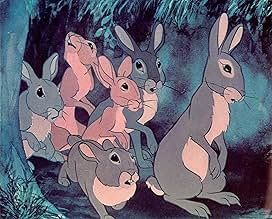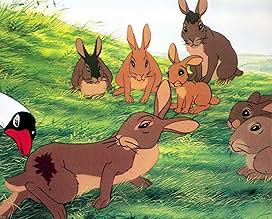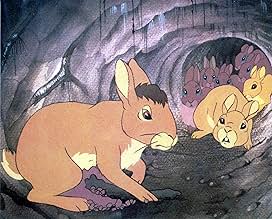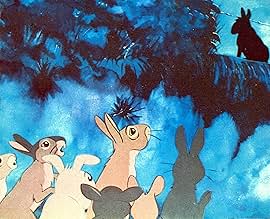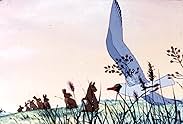Une colonie de lapins s'enfuient de leur habitat condamné et s'affrontent à beaucoup de dangers afin de trouver et de protéger la nouvelle habitation.Une colonie de lapins s'enfuient de leur habitat condamné et s'affrontent à beaucoup de dangers afin de trouver et de protéger la nouvelle habitation.Une colonie de lapins s'enfuient de leur habitat condamné et s'affrontent à beaucoup de dangers afin de trouver et de protéger la nouvelle habitation.
- Prix
- 1 victoire et 4 nominations au total
Richard Briers
- Fiver
- (voice)
Ralph Richardson
- Chief Rabbit
- (voice)
Michael Graham Cox
- Bigwig
- (voice)
- (as Michael Graham-Cox)
John Bennett
- Capt. Holly
- (voice)
Simon Cadell
- Blackberry
- (voice)
Terence Rigby
- Silver
- (voice)
Roy Kinnear
- Pipkin
- (voice)
Richard O'Callaghan
- Dandelion
- (voice)
Denholm Elliott
- Cowslip
- (voice)
Lynn Farleigh
- Cat
- (voice)
- (as Lyn Farleigh)
Mary Maddox
- Clover
- (voice)
Zero Mostel
- Kehaar
- (voice)
Harry Andrews
- Gen. Woundwort
- (voice)
Hannah Gordon
- Hyzenthlay
- (voice)
Nigel Hawthorne
- Capt. Campion
- (voice)
- (as Nigel Hawthorn)
Clifton Jones
- Blackavar
- (voice)
Derek Griffiths
- Vervain
- (voice)
- …
Histoire
Le saviez-vous
- AnecdotesThe British Board of Film Classification had received complaints about this movie for over four decades after its release, due to the board's decision to classify it U (suitable for all). The BBFC admitted in 2012 that it had "received complaints about the suitability of Watership Down at U almost every year since its classification". On August 4, 2022, the film was re-rated PG after 44 years.
- GaffesIn Holly's flashback of his time in Efrafa - which occurs long before the other rabbits have even heard of Efrafa - Bigwig can be clearly seen talking with the Efrafan rabbits (this was taken from a scene later in the movie).
- Citations
[last lines]
Narrator: All the world will be your enemy, Prince of a Thousand enemies. And when they catch you, they will kill you. But first they must catch you; digger, listener, runner, Prince with the swift warning. Be cunning, and full of tricks, and your people will never be destroyed.
Commentaire en vedette
Being an Australian, it's rather difficult to sympathise with the plight of rabbits. Following their introduction to our continent in 1859, the European Rabbit population has multiplied at an absolutely phenomenal rate, destroying the natural environment and helping to drive numerous native marsupial species to extinction. They've survived countless attempts to eradicate their numbers, and are now largely resistant to both Myxomatosis and calicivirus. At home, I'm always sure to congratulate my pet dog, Cassie, whenever she trots into the backyard with a rabbit clutched between her teeth. You'll forgive me for launching into a tirade about a troublesome Australian pest, but I'm just trying to convey my general abhorrence towards the species. It would have taken a mighty piece of film-making to make me forget that I hate rabbits, and yet 'Watership Down (1978)' had me utterly engaged from the opening moments. Not only did I care about Hazel, Fiver and Bigwig, but I genuinely fell in love with them, and for 100 minutes I was completely absorbed in their strenuous but noble struggle for survival.
The film is based upon the 1972 novel of the same name by Richard Adams, and was both adapted and directed by Martin Rosen. What struck me most was how incredibly rich the story was, with Adams having created not only a wealth of multi-layered characters, but also an entire rabbit culture and mythology. 'Watership Down' opens with a fascinating Creation story, as the God-like deity Frith (symbolised by the Sun) creates planet Earth and every creature within it. In a double-edged blessing, Frith condemns the mischievous rabbit prince El-ahrairah to forever be hunted, but also to always have the skill and agility to survive: "All the world will be your enemy, Prince of a Thousand Enemies. And when they catch you, they will kill you. But first they must catch you." The events take place in the English countryside, with the title stemming from a hill at Ecchinswell in the county of Hampshire; despite my initial preconceptions, 'Watership Down' was certainly not the story of a sinking ocean liner!
Hazel the rabbit (voiced by John Hurt) may not be physically-imposing, but he is selfless, intelligent and mature, and this makes him a fine leader. His younger brother, Fiver (Richard Briers), is runtish and neurotic, yet he possesses a sort of mystic flair that means his peculiar "feelings" almost always prove significant. After Fiver foresees danger approaching their warren, a small group of rabbits including the brutish but noble Bigwig (Michael Graham Cox) flee their home in search of a safer locale. Their journey is certainly not a walk in the park, and allow me to be the one millionth reviewer to warn parents that many scenes in this film are not suitable for young children. As the group trudge across the English countryside, they are greeted with an assortment of creatures who would be more than happy to make a dinner out of them, including hawks, dogs, cats and humans. However, the rabbits' greatest obstacle before happiness is the nasty, tyrannical Chief-Rabbit, General Woundwort (Harry Andrews), a bloated, domineering lump of a villain who is both reminiscent of George Orwell's Napolean and, oddly enough, Orson Welles' Police Captain Hank Quinlan.
The film is based upon the 1972 novel of the same name by Richard Adams, and was both adapted and directed by Martin Rosen. What struck me most was how incredibly rich the story was, with Adams having created not only a wealth of multi-layered characters, but also an entire rabbit culture and mythology. 'Watership Down' opens with a fascinating Creation story, as the God-like deity Frith (symbolised by the Sun) creates planet Earth and every creature within it. In a double-edged blessing, Frith condemns the mischievous rabbit prince El-ahrairah to forever be hunted, but also to always have the skill and agility to survive: "All the world will be your enemy, Prince of a Thousand Enemies. And when they catch you, they will kill you. But first they must catch you." The events take place in the English countryside, with the title stemming from a hill at Ecchinswell in the county of Hampshire; despite my initial preconceptions, 'Watership Down' was certainly not the story of a sinking ocean liner!
Hazel the rabbit (voiced by John Hurt) may not be physically-imposing, but he is selfless, intelligent and mature, and this makes him a fine leader. His younger brother, Fiver (Richard Briers), is runtish and neurotic, yet he possesses a sort of mystic flair that means his peculiar "feelings" almost always prove significant. After Fiver foresees danger approaching their warren, a small group of rabbits including the brutish but noble Bigwig (Michael Graham Cox) flee their home in search of a safer locale. Their journey is certainly not a walk in the park, and allow me to be the one millionth reviewer to warn parents that many scenes in this film are not suitable for young children. As the group trudge across the English countryside, they are greeted with an assortment of creatures who would be more than happy to make a dinner out of them, including hawks, dogs, cats and humans. However, the rabbits' greatest obstacle before happiness is the nasty, tyrannical Chief-Rabbit, General Woundwort (Harry Andrews), a bloated, domineering lump of a villain who is both reminiscent of George Orwell's Napolean and, oddly enough, Orson Welles' Police Captain Hank Quinlan.
- ackstasis
- 15 nov. 2007
- Lien permanent
Meilleurs choix
Connectez-vous pour évaluer et surveiller les recommandations personnalisées
- How long is Watership Down?Propulsé par Alexa
Détails
Box-office
- Brut – à l'échelle mondiale
- 21 641 $ US
- Durée1 heure 32 minutes
- Couleur
- Mixage
- Rapport de forme
- 1.85 : 1(original aspect ratio)
Contribuer à cette page
Suggérer une modification ou ajouter du contenu manquant

Lacune principale
By what name was Les garennes de Watership Down (1978) officially released in India in Hindi?
Répondre


